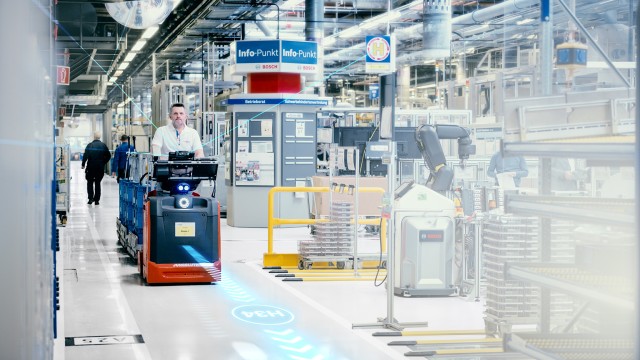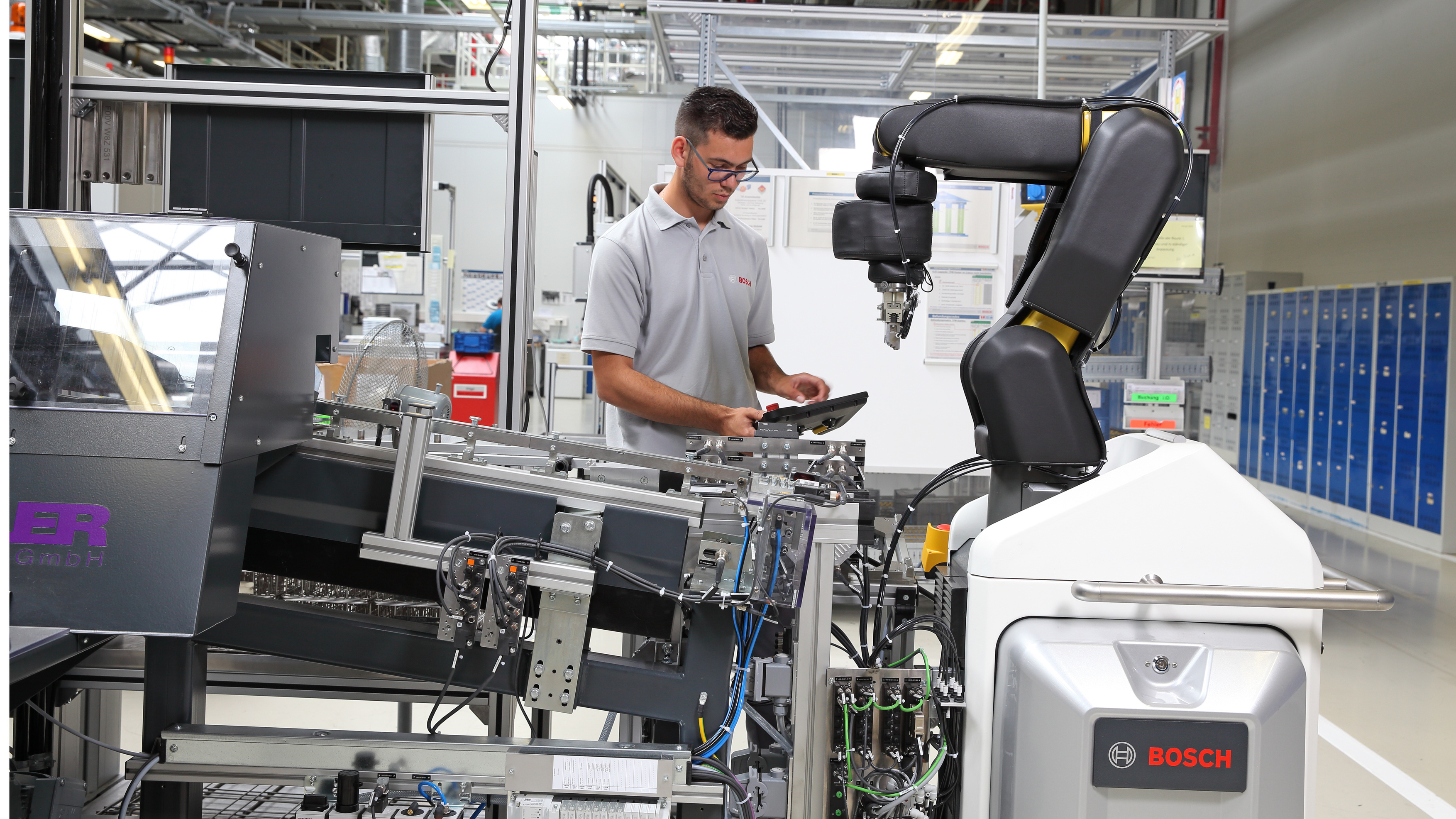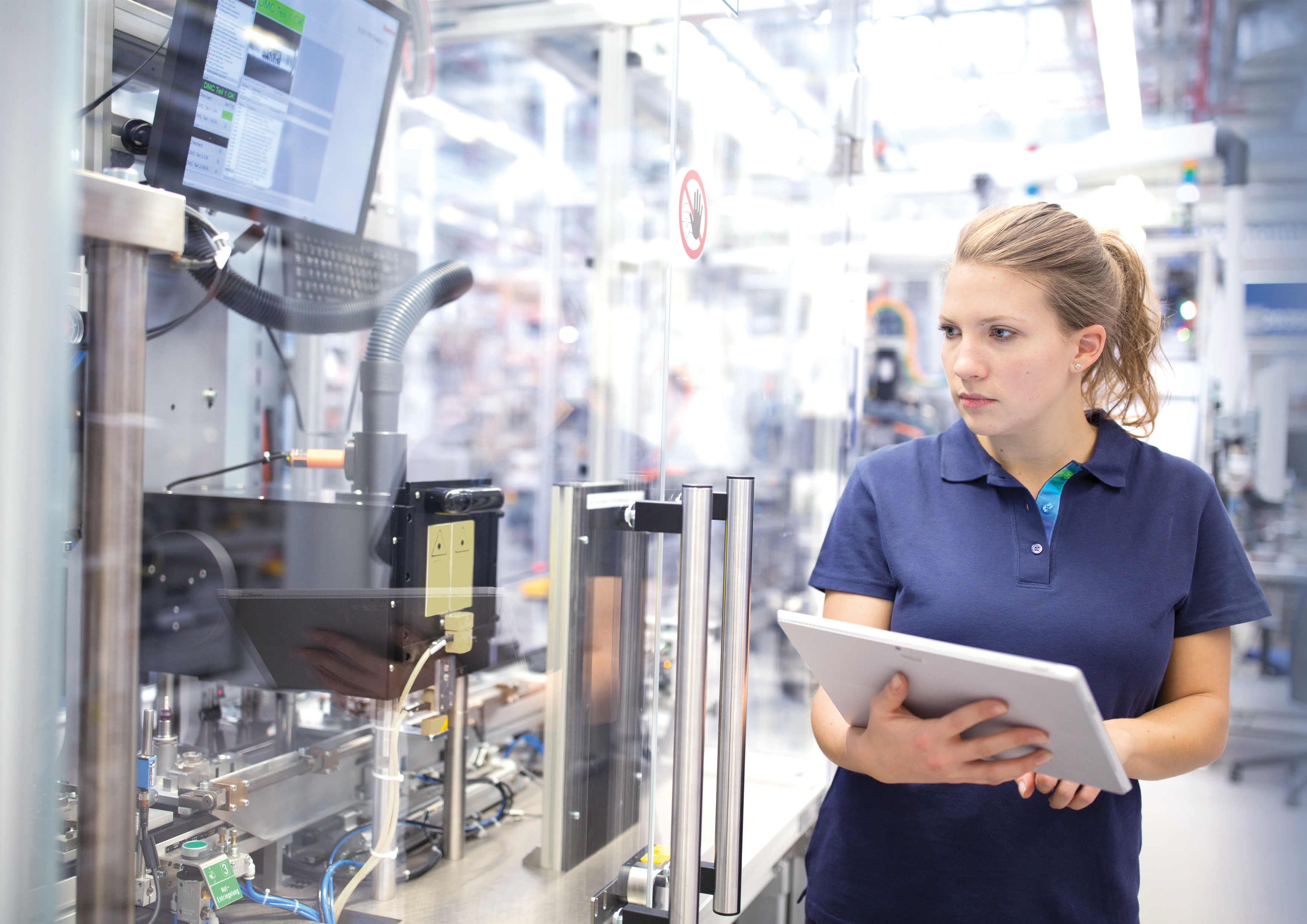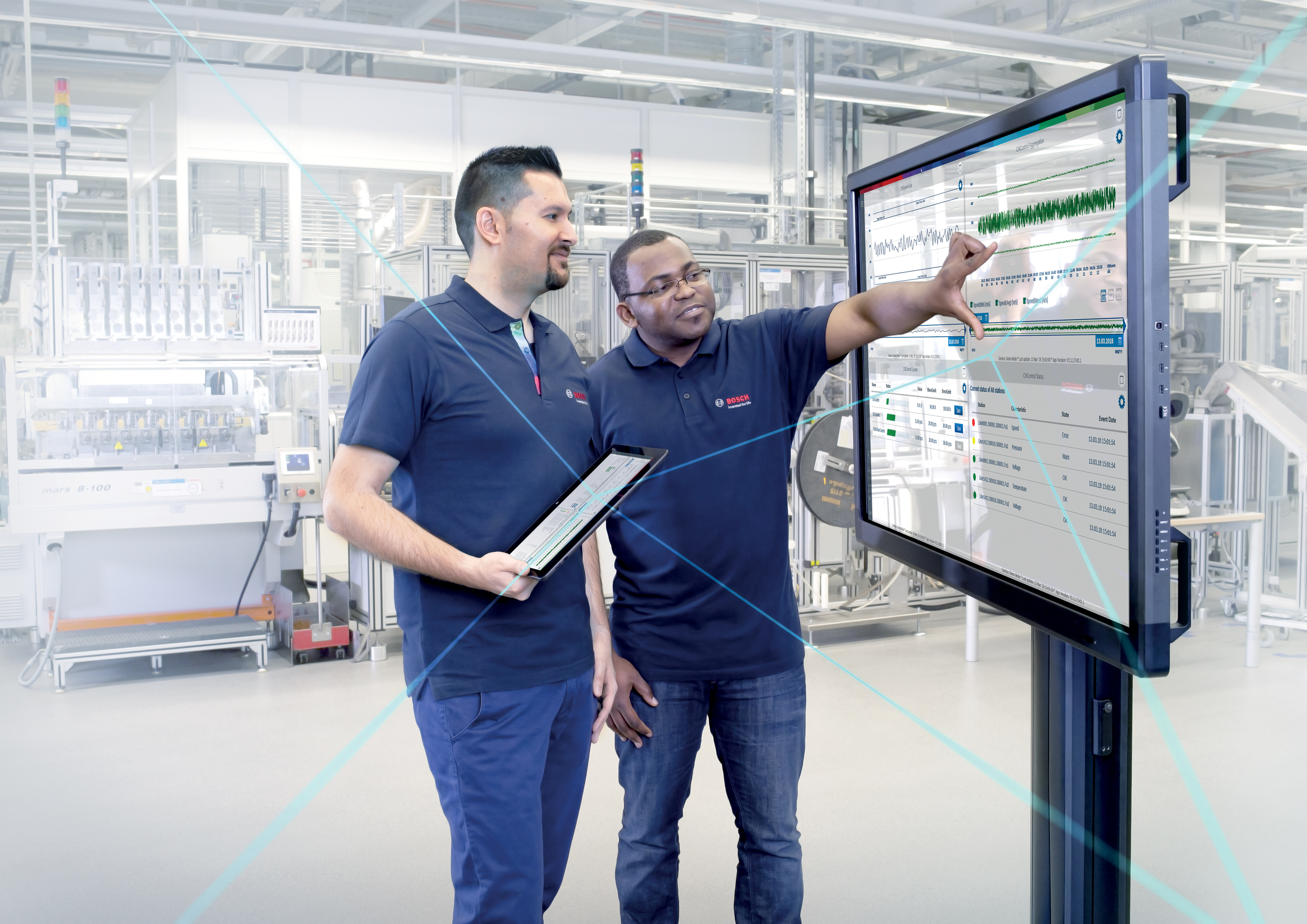Industry 4.0 at Bosch – an overview
Connected manufacturing is a mainstay of the company’s IoT strategy. All Bosch electronic devices will be web-enabled by 2020. “In the IoT, the real and the virtual worlds merge,” says Dr. Stefan Hartung, member of the Bosch board of management with responsibility for industrial technology. “This offers transparency across all processes in real time. In this way, companies can increase their productivity in manufacturing, save resources, enhance safety, and make work simpler. Industry 4.0 adds value – and does so for everyone, at each step along the value chain.” The international Boston Consulting Group predicts that companies will manufacture 30 percent faster and 25 percent more efficiently in a connected industrial world. Bosch is committed to Industry 4.0: it has already implemented connected solutions in virtually all its roughly 280 plants, and has over 60 Industry 4.0-related products and services in its portfolio. This dual strategy of being a leading provider and a leading user also helped Bosch increase its sales of industrial technology by 7.7 percent to 6.7 billion euros in 2017. “Industry 4.0 is not an end in itself. It harbors huge potential,” Hartung says. “To unlock this potential, we need courage and belief in our own abilities and in the power of change. This isn’t for the faint-hearted. Only those who are willing to take risks will be successful in the long run.”
The factory of the future: human creativity required
The floor, the walls, and the roof are fixed; everything else is movable and connected. People control, monitor, and maintain the production lines. Data supplies an overview. Robots provide support and carry out monotonous, repetitive tasks. This is how Bosch envisions the factory of the future. “People are the creative element, the vital link between machines and data,” says Rolf Najork, head of Bosch Rexroth, one of the leading companies in drive and control technology and a wholly owned Bosch subsidiary. Digitalization in manufacturing and logistics improves working conditions and secures jobs. The figures back up this assertion: the Centre for European Economic Research (ZEW) predicts that digitalization will lead to employment growth of 0.4 percent per year up to 2021. While robots are replacing some jobs, the study concludes, this is more than compensated for by job growth elsewhere. “Industry 4.0 ensures that Germany will continue to be an industrial leader in our globalized world,” Najork says.
New qualifications and skills required
The digital transformation in general and Industry 4.0 in particular pose new challenges with regard to training workers and dealing with changing working conditions. Interdisciplinary collaboration, the linking of information and manufacturing technologies, and IT know-how will become increasingly important. In addition, social skills such as self-organization, flexibility, and lifelong learning will be in demand more than ever before. To achieve this, suitable boundary conditions should be created. Bosch has recognized this reality and taken on the responsibility of this task: for example, the Drive and Control Academy at Bosch Rexroth supports vocational and educational training providers and universities by means of training courses, training systems, and modern media technology designed to cultivate skills relating to Industry 4.0. The Bosch plant at Blaichach in southern Germany also offers various career development options, ranging from training videos to the integration of technical devices to full-day seminars. The latter teach participants how to use new systems and explain methods for teamwork and management responsibility. In addition, existing trades and apprenticeships are being adapted and new job profiles developed: Bosch offers training as a production technologist, a combination of a mechatronics apprenticeship and a degree course.
As a global company, Bosch is actively engaged in education and training worldwide. In the central Chinese city of Chengdu, for example, Bosch opened its first Innovation Center for Industry 4.0 in 2017. It offers courses on topics relating to quality, manufacturing, supply chains, and Industry 4.0 solutions. Participants can choose from over 20 different programs. The Innovation Center has a strong practical orientation and offers apprentices the opportunity to work at connected production lines.
Data creates benefits
Bosch combines tried-and-tested production engineering with modern information and communications technology. This approach delivers huge benefits. For instance, associates can access a large variety of data at any time, which they can then analyze and visualize. Errors can be avoided from the very start. And if a fault occurs nonetheless, associates can respond swiftly. This reduces machine downtime and increases production output. “Experience from internal Bosch projects shows that by using intelligent software we can increase productivity every year – at some locations, by up to 25 percent – while also reducing stock levels by up to 30 percent,” explains Dr. Stefan Aßmann, who heads up Bosch’s Connected Industry business unit. “On top of that, we can increase flexibility within plants and retool machines faster and gear them up for customized production – all the way down to batch sizes of one.” It will also be possible for Bosch to become even more economical in its use of resources and make its manufacturing processes even more environmentally friendly. At the Bosch plant in Homburg, Germany, for example, the central IoT software platform uses the presence or absence of associates to determine when a sector is active, and automatically regulates the heating and air conditioning accordingly. “The intelligence of the factory of the future lies in its software – and in the minds of its workers,” Aßmann says. Consequently, Bosch has brought its software together under one roof: with Nexeed, companies can simplify the everyday working lives of its workforce and design their manufacturing and logistics operations so that they are more efficient, more flexible, and more economical in their use of resources.
Intelligent machines
In addition to data, intelligent machines also assist people in their work. Robots weld, glue, assemble, and convey goods around the factory. They react flexibly to people, are able to learn from them, and carry out monotonous tasks and ergonomically difficult sequences of movements. In this way, robots can become colleagues. Recognizing workers, avoiding collisions – production assistants such as APAS from Bosch allow humans and machines to work safely side by side, without the need for a safety barrier. Equipped with comprehensive safety technology, the robot automatically stops without any contact at all when a worker comes too close. For Bosch, APAS is a technological flagship that has applications in a huge variety of industrial sectors. Bosch evaluates the collected data and findings and uses them to continuously further develop the technical assistant.
There is a demand – the number of robots used in industry is increasing. Therefore, compared to the previous year, the global sales have increased by 29 percent in 2017. However, robots do not only relieve employees, they are also an important factor to remove shortages from the job market.
5G to become a key technology
A key condition for the successful implementation of Industry 4.0 is high-performance connectivity infrastructure with fast internet. After all, a large number of sensors, actuators, and other devices will be all connected with each other in the factory of the future. This will give rise to intelligent systems characterized by a high degree of flexibility, efficiency, and adaptability. A key role here will be played by 5G, the fifth generation of wireless mobile technology whose transmission rate, at more than ten gigabits per second, is ten times faster than the 4G mobile phone network. At the same time, this significantly increases the reliability with which data can be sent and received, along with real-time capability. “5G will be the central nervous system in the factory of the future,” says Andreas Müller from Bosch, who is also Chairman of the 5G Alliance for Connected Industries and Automation (5G-ACIA) founded in 2018. The goal of the initiative, which has brought together more than 40 companies and research institutions to date, is to shape 5G from the beginning so that it meets the future needs of industry. For the first time ever, representatives of the traditional automation and manufacturing sectors will be working together with experts from the information and communications technology industry in global, interdisciplinary cooperation, making the alliance a unique phenomenon worldwide. This is a trailblazing approach that others will follow: “Open standards and platforms coupled with cross-industry collaborations will characterize the manufacturing of tomorrow. No one company will be able to mine the treasures of the connected world single-handed,” Müller says.








